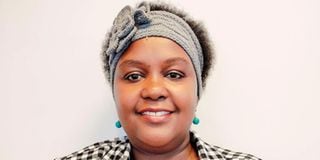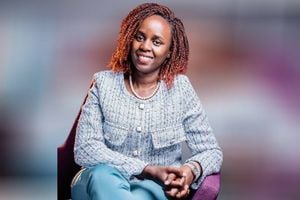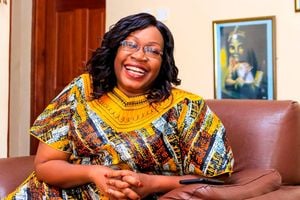
Jacqueline Karita the Business Club and Diaspora Bank Manager at Family Bank.
When Jacqueline Karita packed her bags 12 years ago, ready to relocate from the US to Kenya, she had high hopes. She had been in the US for 14 years. She was certain that soon enough, she would get a job and effortlessly be in sync with her peers and new environment.
After all, she had a Master’s degree and over a decade of experience in America.
But reality would soon hit home. She had over six years of experience working as a financial service consultant at the State Employees Credit Union (Secu), a financial institution in the US.
“I remember starting my applications three months after I came back to Kenya, and when I would get shortlisted for interviews, they would ask me how much I’d want to be paid,” she says.
“Of course, like anyone else who has gained experience abroad and seeking to be employed back home, I had a perspective of how much I wanted to be paid and the level I wanted to start at. I was confident that my education and international experience were transferable to the work environment in Kenya. I soon learnt this was not the case. Many employers were not willing to pay me the much I asked for and I was told multiple times that I did not have the Kenyan experience,” she adds.
She was, however, determined to stay and make it work.
“When I flew back, I bought myself a car because there is a lifestyle that I was used to. I moved in with my sister with the hope of moving out soon enough after securing a job. But after six months of futility in securing a job, I went back to my parents’ home. I was 37 years old then,” says the first-born of three siblings.
She admits that it was a difficult time that was mentally and emotionally draining for her. But her parents, whom she fondly describes as her first mentors, stood by her and offered her all the moral support she needed.
After close to a year of tarmacking, she got called for an interview at Family Bank. She had applied for a bank manager position, and she was excited to be called for the interview.
“I remember thinking to myself after the interview: ‘Hmmm, that was easy!’” she says nostalgically.
What she didn’t know then is that she had interviewed for a much lower and less-paying position — a bank teller. This is a position that is mostly held by fresh graduates as a starting point in their careers.
She got the job, and with nothing to lose and no other options on the table, Jacqueline became a teller at 38.
“The transition was not easy, as many people would wonder why I was working as a teller at my age and with the international experience that I had. The pay was also way less than I had anticipated, and as much as this was difficult, I decided to bury my head fully in my work. I come from a close-knit family, and my mother taught me empathy and patience, while my father instilled in me the importance of persistence and passion. Their guidance shaped my approach to life and work during that period.”
The silver lining with this was the fact that, unlike her young colleagues, Jacqueline was more focused and hardly wasted time.
“They would go for lunch, for example, and maybe take long hours and this worked to my advantage. The bosses started noticing my commitment and the customers I attended also gave good feedback.”
Her efforts saw her swiftly move to customer service before joining the Diaspora Banking Unit in August of the same year. This role allowed her to connect with and serve customers abroad, fostering a sense of global community and connection.
“The diaspora banking department was relatively new when I joined,” Jacqueline recalls. “It was an exciting opportunity to shape a service that truly impacts our customers living abroad.”
With these promotions, she was now able to move from her parent’s house and start life afresh in her early forties.
In August 2014, she was appointed as the relationship manager for the Family Bank Business Club, a role that further expanded her responsibilities. Her return to Family Bank in 2019, after a brief stint elsewhere, solidified her position as a key leader, managing both the Diaspora Banking department and the Business Club.
Also read: Why our families don’t get together anymore
As a manager of diaspora banking, she oversees financial services tailored for Kenyans living abroad, and her role involves a combination of strategic, operational, and customer-focused responsibilities. As a Business Club manager, she markets the club’s services to customers and ensures the implementation of the club’s strategic operation plan as per the bank's strategy.
Reflecting on her career growth, Jacqueline attributes her success to passion, open-mindedness, and adaptability.
“I attribute my growth to passion, open-mindedness, and adaptability,” she says.
Her journey through various roles within the bank has equipped her with a comprehensive understanding of the banking industry and the needs of her customers.
Her leadership style is democratic, emphasising collaboration and open communication. She believes in the power of team input and strives to create an environment where every voice is heard.
“There is no ‘I’ in ‘team’. I encourage my team members to share their opinions and collaborate. It’s through this democratic approach that we achieve the best results.”
Her proudest accomplishment is mentoring colleagues who have since become leaders in diaspora banking at various financial institutions.
This, she believes, is a testament to the power of mentorship and the impact it can have on career growth.
Throughout her career, she admits to facing numerous challenges, from identifying her true passion to navigating workplace politics. Her approach to overcoming these hurdles is grounded in professionalism and a focus on performance.
“To ensure you are true to yourself, one has to be able to self-assess by reflecting on interests, strengths, and values to identify potential career paths,” she explains.
Her journey of self-discovery included about 1.5 years when she left Family Bank to pursue another path, only to realise that her true passion lay within the banking sector.
Her biggest lesson so far has been the importance of choosing oneself.
“Standing up for yourself is non-negotiable,” she advises. “Prioritise your solitude and use that time for personal growth and development. Instead of worrying about the needs, interests, and opinions of others, alone time lets you focus on yourself.”
She is a firm believer in taking calculated risks and stepping out of her comfort zone. Her advice to the youth in the banking sector is to embrace their true passions and not conform to external expectations.
Women of any age, she says, should not be afraid to start over.
“You can achieve anything you put your mind to, and age is nothing but a number. People will always judge you, whether or not you decide to start over. Never let their opinions hold you back.
Outside of her professional life, Jacqueline enjoys spending time with her family.
Fun for her is spending time with her nephews, who range from 13 years to five months old, as well as with her parents and siblings. She also enjoys watching documentaries and historical TV series like Downton Abbey, The Tudors, 1883, and 1923.
“Non-fulfilment of my legacy keeps me awake at night,” she confesses. “Have I left a lasting impression on my family, friends, and community in general that they would think of as inspiring and influencing their lives?”
If given the chance to take back the hand of time, Jacqueline would prioritise personal interests and passions over societal or familial pressures.
“I would invest more time and effort into building and maintaining meaningful relationships by setting clear boundaries and prioritising self-care by making more time for personal enjoyment and family,” she reflects.
Additionally, she would volunteer more for causes that she cares about.
“Always be grateful for what you have,” she says.
“Expressing gratitude is the foundation for all abundance. It costs nothing to say thank you, and it’s the greatest gift you can give someone.”









